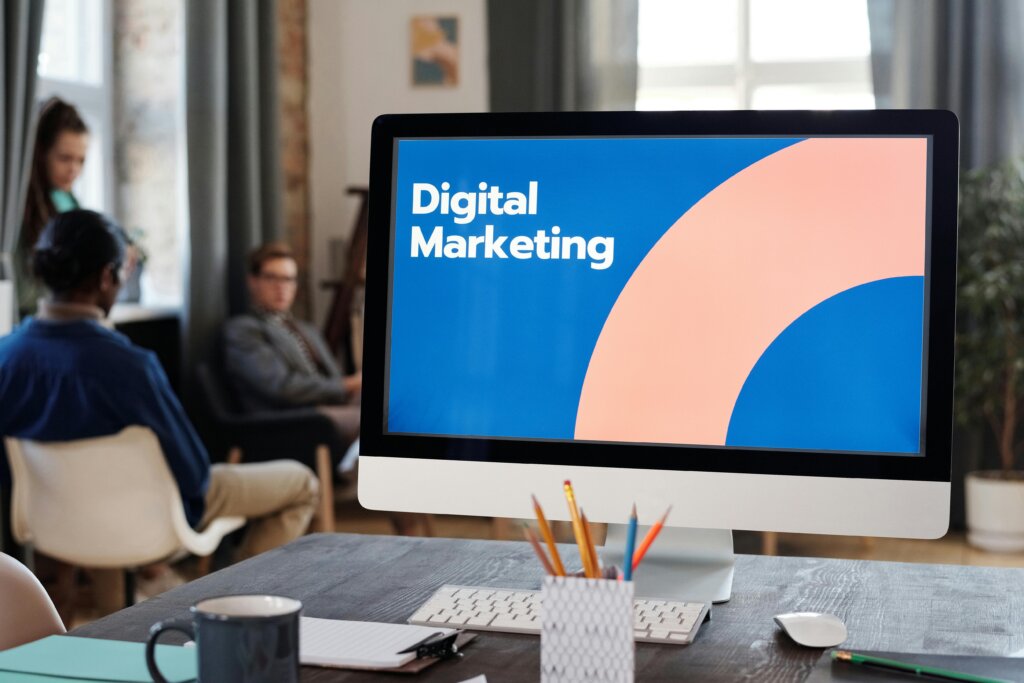How to success in business by learning Importance of Digital Marketing

In today’s fast-paced digital age, businesses of all sizes must adapt to reach and engage their target audience effectively. Digital marketing provides a powerful platform to connect with customers, build brand awareness, and drive sales.
What is Digital Marketing?
Digital marketing is a strategic approach that utilizes digital channels to reach and interact with potential customers. This encompasses a wide range of tactics, including:
- Search Engine Optimization (SEO): Improving your website’s visibility in search engine results pages (SERPs) through optimization techniques.
- Pay-Per-Click (PPC) Advertising: Creating and managing paid ads on search engines and social media platforms.
- Content Marketing: Creating and sharing valuable content to attract and engage your target audience.
- Social Media Marketing: Building and maintaining a strong online presence on social media platforms.
- Email Marketing: Nurturing relationships with customers through targeted email campaigns.
- Mobile Marketing: Optimizing your marketing efforts for mobile devices.
The key advantage of digital marketing is its precision and measurability. Unlike traditional marketing methods, digital marketing allows you to target your ads to specific demographics, interests, and behaviors. This means your messages are more likely to resonate with your ideal customers, increasing the chances of conversion.

Digital marketing can offer numerous benefits to your business. It can help you:
- Increase brand awareness. Digital marketing can help you to increase brand awareness by getting your name in front of more people. This can be done through a variety of channels, such as social media, search engine optimization (SEO), and content marketing.
- Generate more leads. Digital marketing can help you to generate more leads by driving traffic to your website and capturing contact information from visitors. This can be done through a variety of channels, such as pay-per-click (PPC) advertising, email marketing, and social media.
- Improve customer engagement. Digital marketing can help you to improve customer engagement by providing valuable content and creating a community around your brand. This can be done through a variety of channels, such as social media, email marketing, and blogging.
- Increase sales. Digital marketing can help you to increase sales by driving traffic to your website and converting visitors into customers.
- Build customer loyalty. Digital marketing can help you to build customer loyalty by providing excellent customer service and staying connected with your customers.
Real-Life Examples of Successful Digital Marketing
Here are a few real-life examples of businesses that have successfully used digital marketing:
- HubSpot. HubSpot is a marketing software company that has used digital marketing to become one of the most well-known names in the industry. HubSpot uses a variety of digital marketing channels, including SEO, content marketing, social media, and email marketing.
- Airbnb. Airbnb is a vacation rental marketplace that has used digital marketing to disrupt the hospitality industry. Airbnb uses a variety of digital marketing channels, including SEO, content marketing, social media, and email marketing.
- Buffer. Buffer is a social media management platform that has used digital marketing to build a loyal customer base. Buffer uses a variety of digital marketing channels, including SEO, content marketing, social media, and email marketing.
The Importance of Digital Marketing for Business Owners
Digital marketing is essential for business owners in today’s competitive landscape. Through digital marketing, businesses can:
- Reach a wider audience. Digital marketing allows business owners to reach a wider audience than traditional marketing methods.
- Generate more leads. Digital marketing can help business owners to generate more leads and grow their businesses.
- Increase sales. Digital marketing can help business owners to increase sales by driving traffic to their websites and converting visitors into customers.
- Build brand awareness. Digital marketing can help business owners to build brand awareness and establish their businesses as thought leaders in their industries.
- Improve customer loyalty. Digital marketing can help business owners to improve customer loyalty by providing excellent customer service and staying connected with their customers.
The Importance of Digital Marketing for Others
Digital marketing is not only important for business owners. Digital marketing is also vital for individuals such as:
- Job seekers. Digital marketing is a growing field, and there are many job opportunities available for people with digital marketing skills.
- Consumers. Digital marketing provides consumers with a wealth of information and resources.
- Students. Digital marketing is a valuable skill that can be used in a variety of careers.
To effectively leverage digital marketing, it’s essential to have a clear strategy. Begin by asking yourself:
- What are your business objectives? Identify the specific outcomes you want to achieve through your digital marketing efforts.
- Who is your target audience? Grasp the desires, habits, and digital footprint of your target audience.
- What are your key performance indicators (KPIs)? Establish key performance indicators (KPIs) to gauge your marketing effectiveness.
Once you have a clear understanding of your goals, target audience, and KPIs, you can develop a tailored digital marketing strategy. This strategy should outline your approach, tactics, and budget allocation for each digital marketing channel.

Essential components of a successful digital marketing strategy include:
- Content Creation: Develop high-quality, engaging content that resonates with your target audience and addresses their needs. This can encompass a variety of content formats, such as blog posts, articles, videos, infographics, or social media posts.
- Search Engine Optimization (SEO): Optimize your website and content to improve your search engine rankings and attract organic traffic. This involves using relevant keywords, creating high-quality backlinks, and optimizing your website structure.
- Pay-Per-Click (PPC) Advertising: Consider using paid advertising platforms like Google Ads and social media advertising to reach a wider audience and drive immediate results.
- Social Media Marketing: Create and manage a consistent social media presence on platforms relevant to your target audience. Engage with your followers, share valuable content, and run targeted campaigns.
- Email Marketing: Build an email list and send targeted email campaigns to nurture leads and drive conversions.
- Mobile Optimization: Ensure your website and content are optimized for mobile devices, as a growing number of users access the internet on smartphones and tablets.
- Analytics and Tracking: Implement tracking tools to measure the performance of your digital marketing efforts. Analyze key metrics like website traffic, conversions, and return on investment (ROI).
A Beginner’s Guide to Digital Marketing
If you’re interested in diving into the world of digital marketing, here are some essential tips to get you started:
1. Learn the Basics
- Online Courses: Platforms like Coursera, Udemy, and Google Digital Garage offer comprehensive courses on various digital marketing aspects.
- Books: Read books by industry experts to gain in-depth knowledge.
- Blogs and Articles: Stay updated with the latest trends and best practices through blogs and articles from reputable sources.
2. Get Certified
- Google Ads and Analytics: These certifications can enhance your credibility and demonstrate your proficiency in these essential tools.
- HubSpot Marketing Certification: This certification covers a wide range of digital marketing topics.
- Facebook Blueprint: Learn about Facebook advertising and marketing strategies.
3. Utilize Social Media:
- Choose the Right Platforms: Identify the social media platforms that are most popular with your target audience.
- Create Engaging Content: Share valuable and relevant content that resonates with your audience.
- Interact with Your Followers: Respond to comments and messages to build relationships with your audience.
- Run Social Media Ads: Promote your content and offers to reach a wider audience.
4. Start Small and Focus
- Identify Your Goals: Determine what you want to achieve with your digital marketing efforts.
- Choose a Few Channels: Begin with a few channels like social media or SEO and gradually expand as you gain experience.
- Measure Your Results: Track your progress using analytics tools to understand what’s working and what’s not.
5. Understand Your Target Audience:
- Who are you trying to reach?
- What are their needs, wants, and pain points?
- Where do they spend their time online?
- What are their preferred communication channels?
6. Utilize Free Tools
- Google Analytics: Track website traffic and user behavior.
- Google Search Console: Monitor your website’s search performance.
- Canva: Create professional-looking graphics and designs.
- Buffer: Manage your social media content.
7. Develop a Comprehensive Strategy:
- Set Goals: Determine what you want to achieve with your digital marketing efforts.
- Identify Channels: Choose the channels that align with your target audience and goals.
- Create a Content Calendar: Plan your content creation and distribution schedule.
- Set a Budget: Allocate a budget for your digital marketing activities.
8. Optimize Your Website:
- Optimize for Mobile: Design your website to adapt seamlessly to various screen sizes.
- Fast Loading Speed: Optimize your website’s speed to improve user experience and search engine rankings.
- SEO-Friendly Content: Use relevant keywords and meta descriptions throughout your website.
- User Experience (UX): Create a clear and intuitive user experience to encourage visitors to stay on your site.
9. Analytics and Reporting:
- Track Your Progress: Use analytics tools like Google Analytics to track your website traffic, user behavior, and conversion rates.
- Measure Your Success: Monitor your KPIs to determine the effectiveness of your digital marketing efforts.
- Make Data-Driven Decisions: Use the data to identify areas for improvement and optimize your campaigns.
10. Stay Updated and Learn Continuously:
- Follow Industry Trends: Keep up with the latest digital marketing trends, technologies, and best practices.
- Attend Workshops and Conferences: Participate in industry events to learn from experts and network with other professionals.
- Take Online Courses: Continue to learn new digital marketing skills through online courses and tutorials.
Remember, digital marketing is an ongoing process. By following these tips and continuously learning, you can effectively leverage digital channels to achieve your business goals.

Conclusion
Digital marketing is an essential tool for businesses of all sizes in today’s competitive landscape. By effectively leveraging digital channels, businesses can:
- Reach a wider audience: Connect with potential customers across the globe and expand your market reach.
- Generate more leads: Attract qualified leads through targeted marketing efforts.
- Increase sales: Drive conversions and boost revenue through effective digital marketing strategies.
- Build brand awareness: Establish your brand as a trusted authority in your industry.
- Improve customer loyalty: Foster strong relationships with your customers and encourage repeat business.
If you’re looking to improve your digital marketing efforts or just getting started, there are numerous resources available to help you. Consider these additional steps:
- Conduct a thorough audit: Assess your current digital marketing efforts to identify strengths, weaknesses, and opportunities for improvement.
- Establish Well-Defined Objectives: Set clear, quantifiable, attainable, relevant, and time-bound (SMART) goals for your digital marketing initiatives.3. *Create a comprehensive strategy:* Develop a well-structured plan outlining your target audience, messaging, channels, and budget.
- Utilize analytics tools: Track and analyze your digital marketing performance to measure ROI and make data-driven decisions.
- Stay updated with industry trends: Keep up with the latest digital marketing trends and technologies to stay ahead of the competition.
By following these steps and implementing effective digital marketing strategies, you can position your business for success in the digital age.
To know more about digital marketing and its importance you can go through our website Vivek Digital Media
Leave a Comment